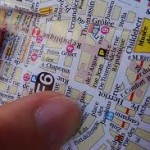From EXPLORE MAGAZINE, March 2010
Let me tell you a few things about my relationship with the points of the compass, and then we’ll jump to the meat of this thing.
At shopping malls, my eldest daughter has to frequently tell me where we parked. She is five.
Once, while visiting Paris, I went out for a jog and got disoriented. Eventually I spotted a police officer, and I pulled from my shoe the address where we were staying. “Ah,” he said. “You want to go back to Paris.”
On a quest many years ago to climb the highest mountain on Vancouver Island, a pal and I got so lost that there was no turning back, because it just wasn’t clear which way back was. It wasn’t clear where forward was, either, except that we’d seen a plane fly in over the ridge ahead, so we went that way. (Did I mention that my pal was bleeding from a head wound?) It was a long shot but—don’t you see?—it was the only shot, because that slot in the horizon was our lone landmark.
I am like Captain Peter “Wrong Way” Peachfuzz on the old Rocky and Bullwinkle TV show, who was so navigationally inept that the crew kept him on a fake bridge, with dummy instruments, so that buy generic phentermine imprint e5000 he’d think he was in charge while the ship was in fact being steered elsewhere. My instincts are reliably wrong—which is as good as their being reliably right. You can take a “gut” reading and—Hello, Cleveland!—go do the opposite.
I tell you this not as a pathetic cry for help, or a claim to a perverse kind of pride, but to try to understand: Why does people’s sense of direction vary so wildly?
My own case by no means defines the low ground. There is a woman in my hometown of Vancouver—I can’t tell you who because she’s only described, not named, in the journal Neuropsychologia—who suffers from a pathology called “developmental topographical disorientation.” She’s in her 40s, and in most ways fully functioning—she can watch TV and read the newspaper and even get to and from work so long as she doesn’t deviate one iota from her regular route. But she can also get lost on the way home from the bus stop. She can’t make and store accurate mental images of her environment.
This kind of impairment is vanishingly rare, but it does make you wonder. Are those of us with more moderate symptoms different in kind or just degree? Is there a genetic component to this?
Full post:
www.utne.com/GreatWriting/Why-Do-I-Get-So-Lost-Navigation.aspx

